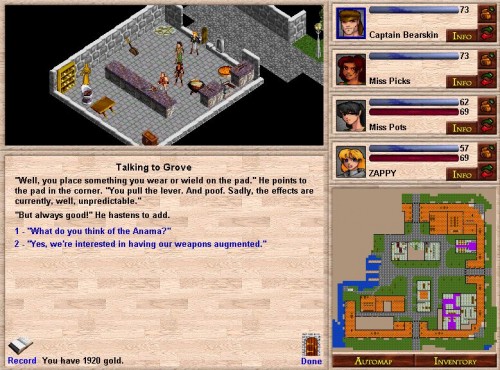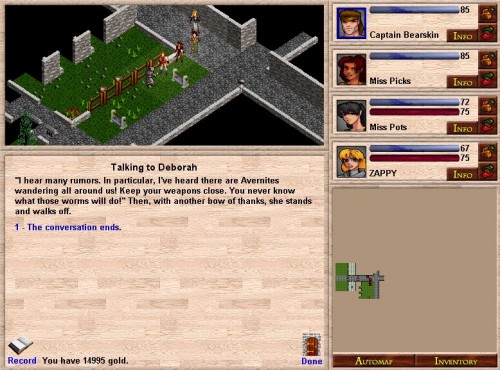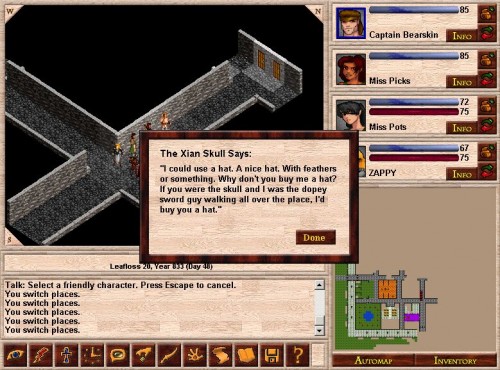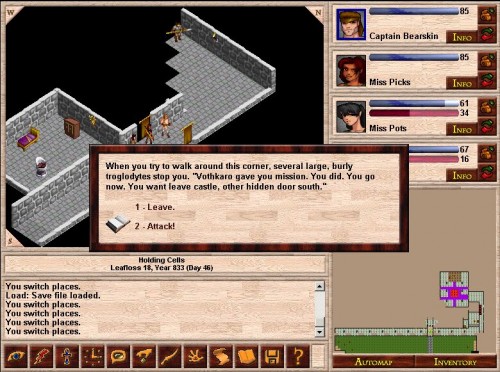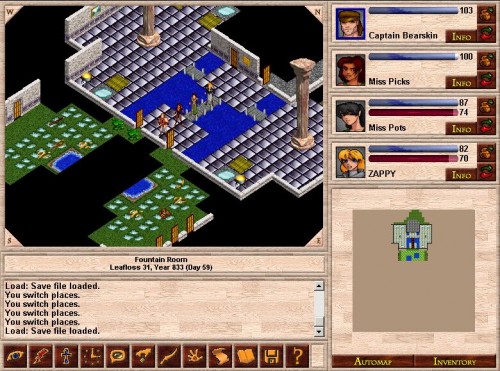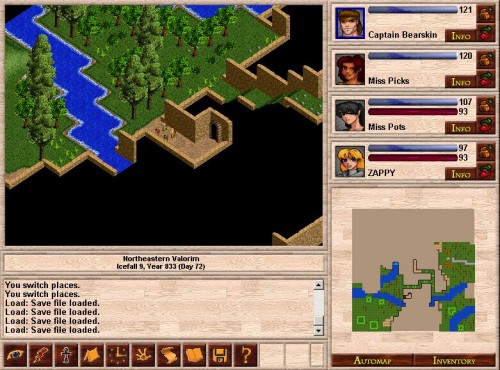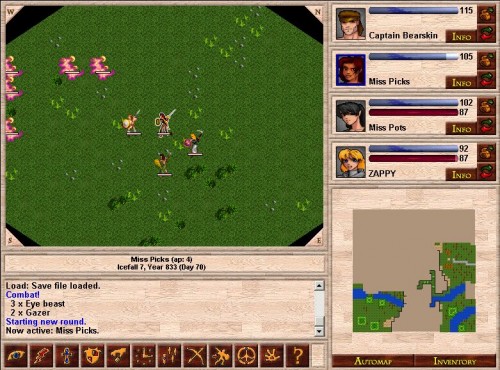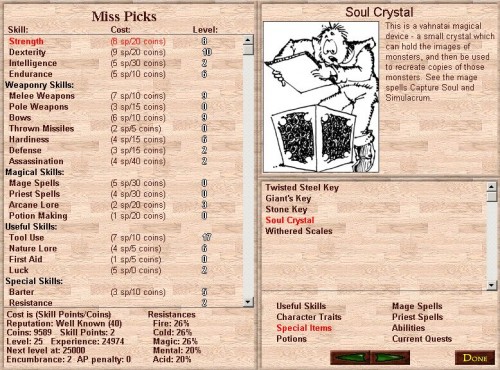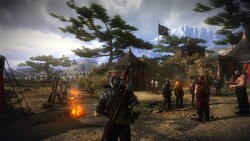Avernum 3 Review
Avernum 3 Review
Codex Review - posted by Saint_Proverbius on Fri 22 November 2002, 21:12:39
Tags: Avernum 3; Spiderweb SoftwareTwo steps backwards, in a good way
Probably the first thing you'll notice when you fire up Avernum 3 is that it's not the most modern CRPG out there. It doesn't have a lot of automation about it. It doesn't have the latest graphics to push your several hundred dollar graphics card. It doesn't have fast paced, passive combat that you spend most of your time watching. It doesn't make the claim that there are 300+ spells. It, frankly, doesn't have a lot of the hooks that modern CRPGs use to sucker you in to buying them.
That's not a bad thing at all, because what it does offer is a challenging and rewarding experience in the tradition of the older CRPGs. If you're looking for an old school CRPG fix, similar to Ultima, Wasteland, or the old Gold Box games, that's what Avernum 3 offers. It's a straight shooting, party based CRPG that involves a lot of quests, a lot of locations to save, or not save, interesting combat, and more.
It's fantasy, but not as you know it
Avernum 3 is basically a fantasy CRPG, like so many of them are. It's also not your standard Elves and Orcs kind. Things are different in this world. Sure, you have the standard swords and sorcery you expect from the fantasy setting, but you're not going to see the Tolkien lore going around here. For example, you will see unicorns, but they're not the cuddly things your younger sister might have put on her wall. They're goats with one horn and a very nasty disposition. In fact, most people hate them and offer rewards for their deaths.
You won't find Elves, or Orcs, or Dwarves, and you won't be playing those races either. That's not to say you won't see some fantasy monster types you're used to seeing, the game just doesn't do everything you'd expect. You can expect to see Troglodytes, Hill Giants, Dragons, and a few other fantasy favorites. You can expect that a lot of them are up to no good as well.
Naturally, there are mages running around causing trouble. There are bandits attacking towns and ambushing people on roads. There are towns filled with nigh unstoppable town guards. There are priest cults. There are towns in dire need of protecting from great evils they can't deal with on their own. There are evil temples protected by lesser demons.
It may not be the straight up fantasy faire that's in most CRPGs, but you won't be totally lost here.
School in the summer.. No class
The character system in Avernum 3 is basically a classless system. However, for those who are just starting out and don't want to scratch build a fighter or mage or priest, the game provides you with templates for these character types that you can select upon creation. You can simply start with the premade characters, or you can select a premade class, race, gender, give it a name and you're good to go.
For those who do like to scratch build their characters, there's a lot of interesting stuff to decide. Characters have four basic attributes. Strength determines melee damage, carry weight, and a few other things. Dexterity determines how well your character is at hitting what he wants to hit and how well he can keep from getting hit. Endurance is the attribute that determines health and poison and disease resistances of your character. Lastly, Intelligence determines how much Mana your character has, how resistant your character is to mental attacks, and several other things.
In addition to these basic attributes, the game offers many standard skills. You have your basic combat skills, like Melee Weapons, Pole Weapons, Bows, and Thrown Missiles, which are the basis for how well you use physical weaponry. However, you also have things like Assassination, which gives bonus damage to your attacks. There are two defensive skills as well. The armor skill, called Hardiness, helps you move in your armor as well as absorb more damage. Then there's Defense, which helps you not get hit. Not getting hit is a good thing.
There are magical skills as well, which are fairly straight forward. Mage Spells determines how well you can use those type of spells as well as gives a boost to your mana. Priest Spells does the same thing, only with.. Well, priest spells instead of mage ones. Potion Making governs your ability to mix up those potions you'll find yourself needing in the dungeons, so long as you have the ingredients. There's also Arcane Lore, which helps identify items.
There are also "Useful Skills", such as Tool Use, which helps you pick locks and operate machines. Luck, First Aid, and Nature Lore are examples of these.
However, skills don't end there. Those are just the skills you can tweak when you create characters. Along the way, you'll run across several other skills you can learn from tradesmen or special crystals. Some of these skills can be trained by trainers found throughout the game once you learn them, some can't.
As mentioned before, the character system is basically classless. If you want a paladin like character, all you have to do is devote your skill points that you get when you level up towards what you think a paladin is like. Boost your Melee Weapons, boost your Hardiness, boost your First Aid, and boost your Priest Spells, and you have the basics of a paladin right there. Also, just because your character starts out a fighter doesn't mean he has to stay one. You're free to advance him however you'd like.
There are really no restrictions as to what your character can do, regardless of how he's created. If you want a battle tank mage, you can do that. Just boost the Strength of the mage so he can carry the armor, and boost the Hardiness of the mage to avoid movement penalties.
In addition to the skills, you also have the choice of giving your character Advantages and Disadvantages. These will either give your character special abilities from the start at the cost of some experience gaining, or some detrimental things that will boost experience gain. You can apply two of these two your character. So, if you want to start as a deadly swordsman, you can, but you won't get the experience everyone else will. Then you can use something like sickliness to offset that experience penalty.
About the only thing really lacking in this system is a Speech Skill and Charisma modifiers.
Nuts! And other battle expressions
Combat is turn based, sticking with the old school nature of the title. It's the standard Action Point system that a lot of turn based systems use. However, typically, most things, like your characters, will have roughly 4APs per round. This means that rounds don't take very long since there's only so much you can do in 4AP. You can move four times. You can move three times and swing a weapon. You can move three times and cast a spell. You get the idea.
Magic shines in terms of Avernum 3 combat since it provides a great deal of tactical options. You can summon up nasty monsters for fodder. You can bless your party. You can Forcecage an enemy. If there's a mob of puny critters, a lot of your spells are multitarget, meaning you can cast a spell on a group of enemies to wipe them all out.
The game doesn't have a lot of spells, and there is some replacementism going on with them. However, it is important to note that spells all have three levels of power and that your skills and attributes also play a level in how well these spells do. The higher your skill level with that type of magic, the more targets you might be able to select on a multitarget spell, for example.
Another nice feature of the combat is that ammo isn't always lost by usage. If you fire an arrow, for example, that arrow may or may not exist at the end of combat for you to reuse later. This is a particularly good feature, since it means you don't have to run to the nearest Fletcher as often to get those super arrows you've gotten used to using.
The combat system is pretty simple, though. If you really like X-Com or Jagged Alliance or even Fallout, you won't see the options those games give you in this title. A standard fighter really has few options in combat. For the most part, the fighter will just use his APs moving in to position, and then whack on the enemies. You can up a fighter's Bow or Thrown Missiles skill to give him more options in combat, but that's pretty much it for the fighter. Aimed attack on body location or melee attack types would have been a very nice addition to this system.
The combat does it's job though. It's fairly tactical at times, it provides a challenge, it doesn't take forever, and most importantly, it's enjoyable.
Faults and nit picking
Avernum 3 has it's faults, like any game. Some of which are my opinion, some are the opinions of others, but presented because these are things you may or may not like about this title for your perusal.
The interface in the game is very, very old school. In fact, you may want to ditch the mouse and just use a keyboard to control the game since the keyboard seems to do everything better than the mouse. If your hand is pretty much glued to the mouse, and you like it that way, you may not like the interface for Avernum 3. While you can play with the mouse, it's very awkward. Movement is especially awkward since there isn't any pathfinding in the game and the mouse just acts as the arrow keys act. This is especially tricky in areas that involve lava and other hazards where you need more precision from your controls.
In addition to that, there's a layer of control that most people might not be used to seeing in CRPGs. To open a chest, for example, you have to be next to the chest, and look at the chest with the look command to gain access to what's inside it. This as opposed to the more modern CRPGs where you simply click on the chest and it opens. Like I said, the mouse in this game doesn't really do much. The same thing goes for talking to people. Rather than just clicking on them, you must first state, via the interface, that you want to talk before you can select who you want to talk with.
There are some problems with the graphics in the game, particularly when it comes to the minimap. If you look at the minimap, it's fairly easy to tell where secret passages are because it partially draws the walls for them. The doors may be hidden, but a careful eye on the minimap will allow you to find these secrets readily in most cases. They're secret, but they're not.
Another problem for some may be the amount of puzzles in the game. Some are fairly obvious as to what you do with them if you play with them from a bit, some aren't. However, it's hard to do any part of the main quest without running across a puzzle in each major area. Unless you're ultra-proficient with puzzle solving, you may have to run to the Spiderweb forum for help, or buy the hint book that they offer. The hint book isn't that expensive though, so that's not much of a big deal. Of course, the forum is free.
Raising skills often requires training at certain towns that offer such facilities. This can be problematic because you have to track down locations where it's offered, but most bigger locations will offer training. However, this does mean that if you need something raised right away, you have to stop what you're doing and head to one of those locations. Since training also requires paying trainers to train you, you may have trouble in the beginning of the game scraping up the cash to get those skills or attributes raised. However, when you level up, your hit points and spell energy will go up automatically based on the skills and attributes you currently have.
Inventories have a maximum slot of twenty items. A lot of items, like potions and components for potions will stack. However, armors, swords, and your basic money making items don't stack. When you're trying to raise funding, this can present a problem since even though your character has the Strength to carry the items, he won't have the slots to gather them all. This may sound like a munchkin issue, but when your party is filled with potion components, food, maps, and other things, you may have to make trips to afford those new spells from libraries.
Along the lines of limits, there is also a 15,000 coin limit that can also get in the way. This is rather odd considering there are things in the game, discussed in the next section, that are geared towards trading and working for additional money. There's really no point in becoming a trade merchant if there's a cap on how rich you can become. You can't drop that money or store it somewhere either, so there's no way around this limit. Also, if you make any money above this limit, it simply vanishes.
Party movement can sometimes be problematic as well. Movement is basically where you move the main character around with the number pad, and the other characters follow, square for square, where the main character moves. That means if you accidentally walk your main character in to some lava or something else, you're either forced to run all the characters through the lava or go in to combat mode to get your main guy out of the lava. The second method is acceptable assuming your main character can take the effects of the terrain type twice, as the terrain type will also affect him as son as combat begins.
The good stuff
Avernum 3 is a very dynamic game. Often times, when you revisit a city, you'll find that things have changed. You may visit a location you've been to before and discover there's something new to do there. This gives the game world a sense of life, that things still go on even though you've been to that location. Even though you've "solved" everything there at the time you're at, a few days later, there might be more to do.
Also, the monster plagues that are ravaging the land also have an effect on the cities as time goes on and if they go unchecked. If you've been piddling around, you may go back to the nearest city and find a shop that you used to frequent turned in to rubble because of the monster attacks. There might be sections of the city wall torn down. If you've waited too long in the extreme, that city may no longer be there. Just ruins of the former city filled with nothing but angry monsters.
This gives the game another dynamic. Do you save the world or cities, or do you simply let the whole thing go to ruin while you do other things? It's up to you to decide that, and there are other things to do than just save the world from the monster hordes. This not only adds a sense of urgency to what you're doing if you're going to save the world, but it also provides a sense of a realistic threat posed by these monsters. Cities are not spared the wrath of monsters just because you'll get to it later like you're used to doing in most CRPGs.
You can take courier jobs, for example. These jobs often have time limits, but the rewards for them are generally worth it. They can range from simple FedEx missions to missions that are more mercenary in nature. You're free to pick the jobs you want to do with them. However, if you fail to do courier jobs in the amount of time required often enough, you may find that courier stations are reluctant to hire you for these assignments.
Likewise, you can also make a living being a trader. Several towns offer positions where you buy something cheap and can sell it elsewhere for profit. They'll tell you about the goods they offer, and then tell you were you can sell them because the demand is high.
Unfortunately, though, you can't keep doing these routes and courier jobs in the same cities, because of the monsters eventually destroying those cities. At some point, you'll have to move on because no one stopped the threat to that region. Of course, that's not to say you can't decide to courier one region until it dies, and then move on and save the next. It's up to you.
There are several factions within the game as well, many are cults. You're free to join them, and they do offer pros as well as cons. For example, one of the cults you'll run in to near the beginning are a cult of anti-magic priests who believe that magic is responsible for all the ills of the world. You can join them, but you have to give up mage use altogether, but they will make your priest abilities much better. Then again, you'll end up being hated by mages just because you are a member of their cult.
Depending on what races you have in your party, people may react differently to you. Often times, a Slith in your party is generally frowned upon because Slith have a long and negative history for a lot of people. You may run across people unwilling to talk to you fully because of this, or who will tell you something totally different. A person that doesn't like Sliths will be much less likely to be as open with you about their opinion of Sliths if you have one. The same thing also applies for the various factions you join.
Another nice thing is the difficulty ramping. Just when you think you're the cock of the walk in the world of Avernum 3, you're bound to run across something nearly as good or better than you. This insures that the game will provide you with a challenge from start to finish, though it may not be good for your ego at times.
Along those lines, there are some very interesting critters in the game. One of my personal favorites would be the Null Bug. Basically, a Null Bug is a large insect that has an anti-magic field around him as a defense. You can't cast magic spells on these bugs, nor can you cast if you're in this field. This can provide some interesting situations when dealing with them.
Magic is actually powerful from the start. Most CRPGs stick with the idea that mages should start pathetically wimpy, and then gradually become the ultimate force of power and destruction. Often times, this means you'll have to protect them for half the game until they become their divine selves. This isn't the case with this game. Both mages and priests start off with the ability to defend themselves and add something to the party even as they start out.
Additionally, as stated before, there's nothing stopping mages from working towards wearing that impressive platemail, or fighters working towards spell casting at some point. This type of flexible system allows you to make any type of character you want. You're only limited by your choices you make upon training. This is a good thing, worth mentioning twice.
Every location has been hand crafted and designed. There is a lot of detail in the locations, including little pop up text gadgets that provide additional information on the locations you are in. While this may be to make up for the graphics engine the game uses, it does provide you with interesting and useful information.
The game offers 150 or so of these locations, several islands full of towns, and weeks of gameplay. The world of Avernum 3 is simply huge. There's a lot to see and do in this game, and it will take a good deal of time to see it from start to finish.
Another strong point in the game is the journal system. Any piece of dialogue or locational information can be stored in your journal with a simple mouse click so you can refer to it later if need be. All quests you pick up along the way are stored on your character sheet, including the important information about them like where you need to go, where you picked up the information, and who the important people are.
Wrap up
Avernum 3 is a very solid, party based CRPG that should remind you of the older days, when CRPGs offered a little more than the "click on monster, watch as your character whacks on it until it dies, move on to next monster" style that a lot of the more modern CRPGs seem to do. If you're looking for some CRPG greatness, and want a change of pace from that, then you might want to try this game.
The game is offered at the Spiderweb Site as a 12MB download for demonstration purposes. If you like the game, you can also register it from that page for a mere $25. Given the amount of content in this game, it's well worth it just for the length of the game and the craftsmanship.





